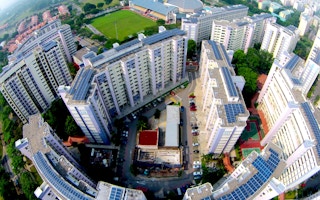Consumers in Singapore who want to lower their environmental footprint and switch to cleaner energy can now do so without buying their own solar power installations.
To continue reading, subscribe to Eco‑Business.
There's something for everyone. We offer a range of subscription plans.
- Access our stories and receive our Insights Weekly newsletter with the free EB Member plan.
- Unlock unlimited access to our content and archive with EB Circle.
- Publish your content with EB Premium.
Solar energy provider Sunseap and infocomm company StarHub have together rolled out a new service that allows Singapore residents to buy solar energy at current electricity prices, thanks to an increasingly liberalised energy market in the city-state.
The new service marks StarHub’s entry into Singapore’s open electricity market and offers consumers a choice of two subscription plans: Green Life and Green Save.
Green Life provides 100 per cent renewable energy at the same price of electricity produced by SP Group, which generates electricity from natural gas and powers the majority of households here. This means there will be no cost difference for consumers who switch to renewable energy.
“
If we are to decarbonise global energy fast enough to avoid the most severe impacts of climate change, renewables must account for at least two-thirds of total energy by 2050.
Adnan Z Amin, director general, IRENA
Green Save is for consumers who want to start off with 5 per cent solar power in their energy mix. Under this plan, consumers will be given a 20 per cent discount off the regular SP Group tariff.
Households and less energy-intensive businesses in Singapore will be able to choose their own electricity retailers in the second half of 2018, when the energy market becomes fully open. Currently, only businesses that consume more than 2,000kWh of electricity are allowed to pick their own energy retailer.
A total of 108,000 households and 9,500 businesses in Jurong were part of a soft launch of the open electricity market on April 1, becoming the first to have the opportunity to purchase electricity from whomever they choose. The StarHub-Sunseap plans are currently available only to those living in Jurong, but will be open to residents elsewhere as the market opens.
Sunseap chief executive officer Frank Phuan said in a statement that the switch to solar energy would not cause any interruption in electricity service.
StarHub’s resources in customer service would make the transition to more renewable energy and smaller carbon footprints fuss-free and seamless to Singapore consumers. “Sunseap is committed to helping customers do their part to lower global warming emissions, which we believe is one of the most urgent challenges of the 21st century,” he said.
Howie Lau, chief marketing officer for StarHub, said in a statement that as a result of its partnership with Sunseap, StarHub will soon be bundling services such as mobile, pay TV, and broadband Internet connection with solar-powered electricity.
“Clean energy has been gaining ground in Singapore and we hope to futher energise this green movement,” Lau said.
At the same time, Lau announced the launch of the StarHub Clean Energy Fund, which will channel 5 per cent of StarHub’s profits from the Green Life and Green Save plans to environmental conservation, clean energy and energy efficiency initiatives in the first three years.
Last year, Singapore announced plans to install photovoltaic panels wherever it can, including at sea, to meet its ambition of generating up to 25 per cent of its energy from solar by 2025.
Due to natural limitations, the city-state has no potential for wind or hydropower, leaving solar as its only viable renewable energy option at present.
The country’s current solar power capacity is 140 MWp, up from just 0.4 MWp in 2008, and has an official solar target of 350 megawatts peak (MWp) by 2020, and 1 GWp “beyond 2020”.
Transitioning to cleaner energy sources is a way to bring countries closer to the goal of limiting global warming to below 2 degrees Celsius. Analysts from the International Renewable Energy Agency (IRENA) said in a report that increasing the adoption of renewable energy by at least a factor of six is the answer to achieving the Paris goals.
IRENA director general, Adnan Z Amin, said: “If we are to decarbonise global energy fast enough to avoid the most severe impacts of climate change, renewables must account for at least two-thirds of total energy by 2050.”








